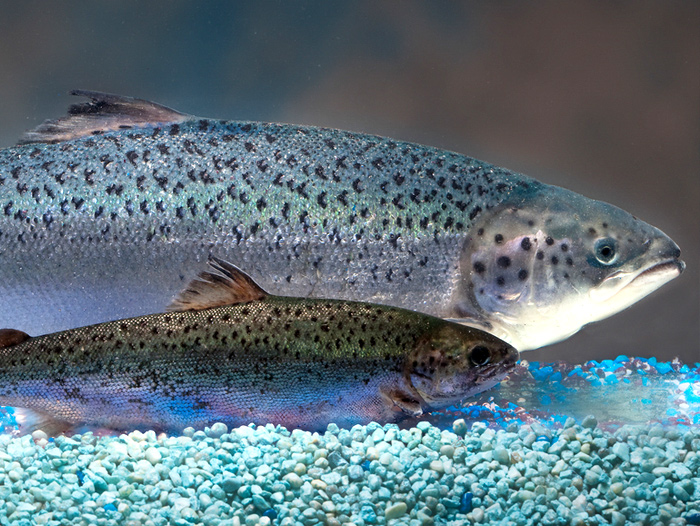Q and A: FDA’s Deactivation of an Import Alert for Genetically Engineered Salmon
March 11, 2019 | 4 min to read

1. What action is the FDA taking today?
On March 8, 2019, the FDA deactivated Import Alert 99-40, which prevented the introduction or delivery for introduction into interstate commerce of food containing GE salmon, including their eggs.
AquaBounty Technologies’ AquAdvantage Salmon is currently the only GE animal for food use that has an FDA approval for its alteration.
With the deactivation of the Import Alert, AquaBounty Technologies is now able to sell food derived from its GE salmon in the U.S. and it may now import its GE salmon eggs to raise in an FDA approved U.S. facility. The only FDA-approved U.S. grow-out facility is a secure, land-based facility in Indiana.
2. Why did the FDA have an Import Alert for GE salmon?
In 2016, the FDA issued Import Alert 99-40 in response to a specific provision in the 2016 Omnibus Appropriations Act, which stated that the FDA may not allow the introduction or delivery for introduction into interstate commerce any food that contains GE salmon, until final labeling guidelines for informing consumers of such content were published. The provision was also included in the 2017, 2018, and 2019 Omnibus Appropriations Acts. In effect, the Import Alert meant that AquaBounty could not import AquAdvantage Salmon, including its eggs or any other food from the salmon, into the U.S.
In 2016, after FDA issued Import Alert 99-40, Congress enacted the National Bioengineered Food Disclosure Standard law, which charged the U.S. Department of Agriculture’s Agricultural Marketing Service (AMS) with promulgating regulations establishing a mandatory disclosure standard for the labeling of “bioengineered” food for human consumption. These regulations were published on December 20, 2018.
3. Why is the FDA deactivating the Import Alert now?
With Congress’s enactment of the National Bioengineered Food Disclosure Standard, USDA was charged with implementing a mandatory standard for disclosing whether a food is “bioengineered” and FDA was divested of its authority over voluntary labeling to indicate the presence of GE content in human foods. FDA no longer has the authority to issue labeling guidance on this topic; however, the FDA believes this Congressional mandate has been satisfied by the U.S. Department of Agriculture’s issuance of final regulations implementing that law in late 2018 because the law and regulations require that human food containing GE salmon bear labeling indicating that it is bioengineered.
4. When AquAdvantage salmon is sold in the U.S., how will it be labeled?
The United States Department of Agriculture’s Agricultural Marketing Service (USDA AMS) regulates the labeling of human food from GE salmon, including AquAdvantage Salmon, under the National Bioengineered Food Disclosure Standard.
In light of the National Bioengineered Food Disclosure Standard (NBFDS) and its implementing regulations issued on December 20, 2018, the FDA is reviewing this draft guidance to consider what additional or new recommendations may be needed for the kinds of products or statements, including claims of non-GE content, that are not covered by the NBFDS.
You can see the 2015 draft guidance here: Draft Guidance for Industry: Voluntary Labeling Indicating Whether Food Has or Has Not Been Derived From Genetically Engineered Atlantic Salmon.
5. Why does the USDA have authority over bioengineered (BE) labeling of human foods, while the FDA has authority over non-genetically engineered (GE) labeling of human foods and both GE and non-GE labeling of animal foods?
In July 2016, the National Bioengineered Food Disclosure Standard (NBFDS), PL 114-216, was signed into law. This law amended the Agricultural Marketing Act and charged the U.S. Department of Agriculture’s (USDA) Agricultural Marketing Service (AMS) with developing a national mandatory standard for disclosing the presence of bioengineered material in human food. The term “bioengineered” as defined in that law includes products that are GE. The law primarily applies to human food derived from plants; however, it does apply to some animal-derived foods, including salmon. As a result, federal law now requires that human food that is derived from or contains GE Atlantic salmon must bear a disclosure on the label that conforms to the national standard, as further defined through final USDA regulations. Therefore, the FDA no longer has authority over voluntary labeling to indicate the presence of GE content in human foods. The FDA retains jurisdiction over labeling statements to indicate the absence of GE content in human food. The NBFDS does not apply to animal food.
6. What does this mean for the 2015 draft guidance, entitled “Voluntary Labeling Indicating Whether Food Has or Has Not Been Derived From Genetically Engineered Atlantic Salmon?”
In light of the National Bioengineered Food Disclosure Standard (NBFDS) and its implementing regulations, the FDA intends to revise its 2015 draft guidance to assist food manufacturers who wish to voluntarily label their food products or ingredients (for humans or animals) derived from Atlantic salmon as not containing GE Atlantic salmon, and for animal food manufacturers who are not covered by the NBFDS but wish to label their products to indicate they do contain GE Atlantic salmon.
As with all foods, a company may include voluntary information in labeling, provided the information is truthful and not misleading.
For more information about FDA’s 2015 approval of AquAdvantage Salmon, please see Questions and Answers on FDA’s Approval of AquAdvantage Salmon.
